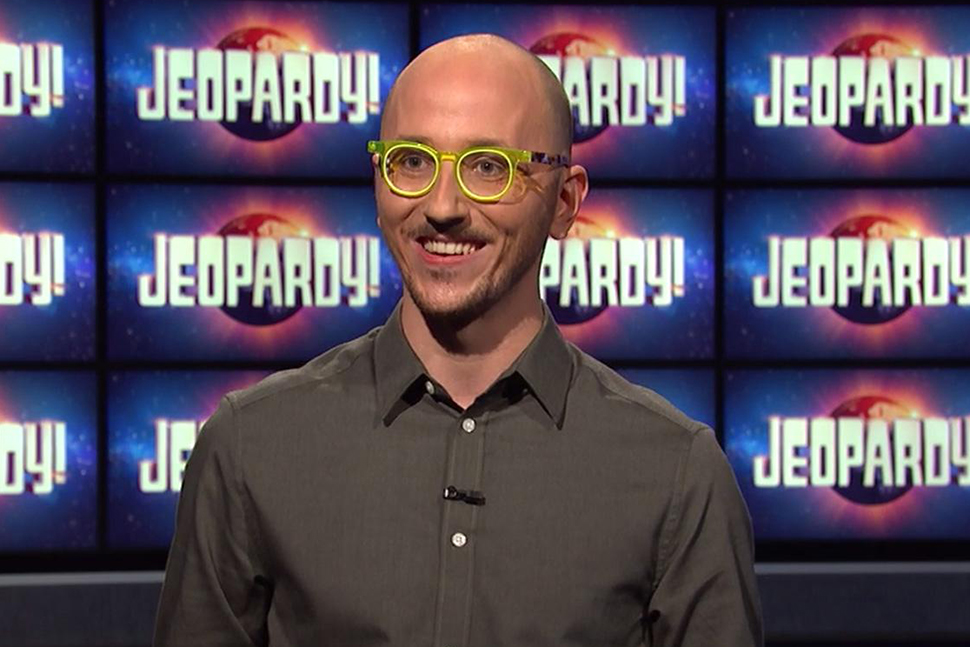Newsmaker: Rhone Talsma

Who is Rhone Talsma?
On January 26, Talsma earned a spot in Jeopardy! history when he unseated fellow contestant Amy Schneider, who had racked up a 40-game winning streak, the second highest on the iconic game show.
Talsma, multimedia librarian at Chicago Ridge (Ill.) Public Library, was the most recent in an impressive line of successful library contestants that includes former University of Chicago librarian Emma Boettcher (who beat 32-game winner James Holzhauer in 2019). Talsma talked with American Libraries about the show, the part libraries have played in his recent success, and how Jeopardy! has affected his life and career.
Were you intimidated to learn you would be up against a 40-game champion?
When I found out, I let it all go. I thought, “I’m definitely not going to win. I’m just going to try to have a good showing and hope that people think I seem like a cool person. I’ll have my moment, and I’ll get Schneidered, just like the rest of us.” But after I won, I was completely beside myself. It was so utterly beyond anything I had envisioned when going into the studio that morning.
Tell us about the differences between your first and second games.
In my first game, I wasn’t thinking about what people would think of me. I was there to have a good time, play my favorite game. I figured it was the only time I would ever get to play. In that second game, however, that is when I was thinking about perception. That threw me off. I thought about the way people back home would perceive me, about the fandom, and how they would react to me as the person who took on the 40-day champion. It was unfortunate that I put that pressure on myself, because it did not help my performance at all.
You were quick on the buzzer.
I do play videogames. I guess that helps. The contestant coordinators do coach you on the buzzer before you play. During rehearsal, you get to be on stage and have the buzzer in your hand while doing practice clues.
To help you know when to buzz in, you wait for the person who manually flips the switch that turns on LED lights that line the entire clue board. They are not visible to people watching on TV. So I would wait for those lights and buzz in. Amy’s amazing, but I was able to get in decently using that strategy.
What else does the viewing audience not see?
The number of cameras, obviously. And it’s intense. There are three cameras pointed the whole time at the three people playing. There’s also the camera that flies in and out. You definitely feel surveilled. The clue board is huge. It’s crazy. I did feel intimidated by the Jeopardy! set. When I walked in as a huge fan, I felt like Charlie in the chocolate factory. I was like, “Oh my God, I am really about to see how the sausage gets made. I’m really about to live my dream. This is crazy.” I don’t think people realize the grandness of that studio.
The other thing people don’t see is that responses need to be reviewed frequently, and when that happens, the game is paused and we’re turned around and the contestant coordinator, basically our handler, keeps us busy and talks to us while the judges go over audio or whatever it is that they need to make determinations on. I have seen people refer to that as Jeopardy! timeout. We were in timeout for one clue for 10 minutes, which on Jeopardy! is a lifetime. That was brutal, just having to wait to get back into the game.

How did your interest in the show develop?
I’ve been watching Jeopardy! pretty much my whole life. The earliest memory I have of watching the show was during Ken Jennings’s run back in 2004. My Uncle Rick was a huge Jeopardy! fan. Whenever we were together, we would watch. That was the last thing we did before he passed away in 2012.
The appeal of Jeopardy! is a combination of just loving trivia, loving learning new things, really appreciating the way the clues are written.
What did you do to prepare?
My main methods of studying were just hopping on Wikipedia and familiarizing myself with things I’m not that familiar with, which for me was movies. Then I studied Shakespeare. I just never caught the bug with that. There are a few things I needed to have down pat: One was US presidents, so I have that memorized now. I also studied the ancient Greek philosophers. So much of the canon on Jeopardy! is oriented toward the West. It’s pretty Eurocentric.
How did libraries influence you growing up?
My strongest memory of Plainfield (Ill.) Public Library, the library in the town where I grew up, was attending their teen program. I was going through a tough period. Middle school was not easy. I was getting bullied. I was also coming to terms with my identity and my sexual orientation and everything, and so it was a really difficult time. Joe Marcantonio, who now works at Schaumburg Township (Ill.) District Library, was the teen librarian at Plainfield at the time. He was able to create the space where I felt safe to really start to figure out who I was and what my interests were and who I was going to be.
What made you decide to become a librarian?
In 2015, after I graduated college, one of my professors [at DePaul University in Chicago], Robin Mitchell, shared that she thought I would make a really good librarian. I realized it was the perfect job for me in so many ways: I love information and I love learning. I also definitely have a passion and a knack for public service.
I started by volunteering at the Gerber/Hart Library and Archives in Rogers Park [on Chicago’s Far North Side]. That is the largest LGBTQ library and archives in the Midwest, and it houses a lot of archival materials of LGBT and queer activism.
Around the same time, I also worked as a cyber navigator at Chicago Public Library. I helped people apply for jobs, learn how to use the computer. Usually they were coming in because they needed to apply for unemployment, jobs, and food stamps, and they needed to find access to services for people who are homeless or needed access to health care.
What was your library’s atmosphere like during your Jeopardy! journey?
My adult services coworkers knew about this whole process, other than me winning, because I wanted them to have the same experience I did. I didn’t know I won that game until the last 30 seconds. They were supportive of me every step of the way.
On Wednesday [January 26], everybody [at the library] watched the Chicago broadcast at 3:30 p.m., and I got to see their reaction to me winning, which was the most amazing and fulfilling thing.
What has been the reaction of patrons and community members?
I have so many emails from patrons congratulating me. So many people in the larger Chicago Ridge community who maybe don’t even know me were rooting for me on Facebook, which was amazing to see.
One patron in particular—this incredible older gentleman who is so curious about stuff and so lively—would ask me these questions that are often in my wheelhouse, questions about geography and history, and I would often show off a bit and answer them off the top of my head. But I always fact-check them. On October 6, the day I was contacted to be on Jeopardy!, I was helping him with a reference question. When I was done, he told me, “You’ll probably be on Jeopardy!” I said, “Maybe someday.” Then I went to the break room, checked my phone, and saw I had been contacted. He was my good luck charm and was beside himself on Wednesday. He was so happy for me.
If you were going to design questions for Library Jeopardy!, what would they look like?
The questions would probably be “Where’s the bathroom?” “How does the copy machine work?” “What time do you close?” “Are you closed for Martin Luther King Day?”
What about categories?
More stereotypical ones would be: Cardigans through the Ages, Different Styles of Tattoos, and What Type of Owl Is This? Probably a whole category about [the animated TV series] Arthur. You have to tailor it. For teen librarians, it’s got to be probably about very cutting-edge social issues. I’m sure videogames would make it in. K-Pop is probably in there too.
Why are librarians so good at Jeopardy!?
By nature, working at a reference desk, you’re always on Jeopardy! My job is to answer questions, figure stuff out, connect the dots. A good Jeopardy! player—and where I think I really excel—is you can figure out the answer even if you don’t know the material, based on context clues. Librarians are more reliant on context than people realize.
Source of Article